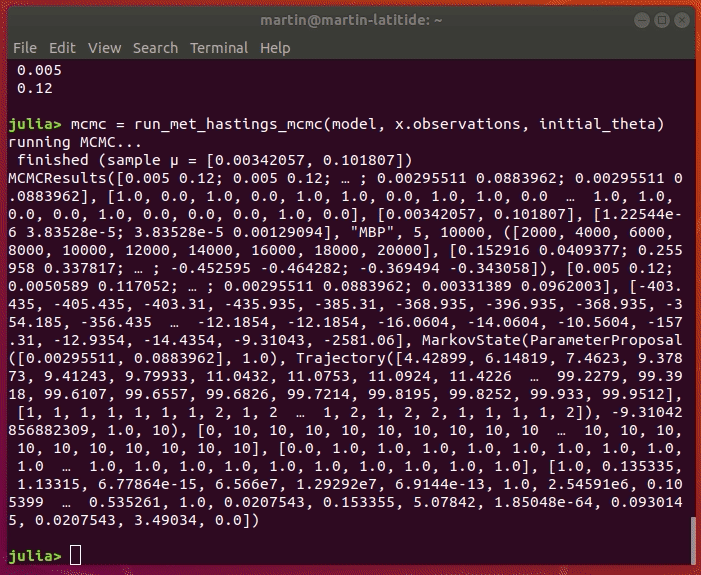Discuit.jl
Fast parameter inference for discrete state space continuous time (DSSCT) models in Julia.
Please note that this package is still in development.
Discuit is a package for Bayesian inference in Discrete state space continuous time (DSSCT) models. DSSCT models, sometimes referred to as compartmental models, are used to represent systems where individuals are assumed, usually as a simplifying abstraction, to move between discrete states. They are a well established research tool in fields including physics, chemistry and ecology. Their use in scientific research typically involves the challenge of comparing ‘noisy’ experimental or observational data to the unobserved (i.e. latent) underlying processes described by the model. Bayes’ theorem provides a convenient framework for dealing with uncertainty in the data. The Bayesian framework also provide a natural, methodologically consistent way of incorporating existing scientific knowledge of the system; the prior distribution of the model parameters
The augmented data Markov chain Monte Carlo (MCMC) methods implemented in Discuit work by introducing a latent variable $\xi$ to the model likelihood function which represents the sequence of events in a single realisation of the model:
See Introduction to MCMC for a basic introduction to MCMC and Introduction to Monte Carlo methods for an overview of random sampling generally. Two algorithms for making proposals to the augmented data space are shipped with the package, with user defined implementations made possible via an alternative custom MCMC framework. Automated tools for analysis and convergence diagnostics include autocorrelation, the Geweke test of stationarity and the Gelman-Rubin diagnostic for multiple Markov chains (a convenient way to run analyses where more than one processor thread is available for use). Simulation via the Gillespie direct method provides a source of simulated observations data for evaluation and validation of the core inference functionality.
See the Discuit.jl models section for a guide to the pre defined model library and the Discuit.jl manual for a description of types and functions. See the Discuit in R package documentation for a description of the equivalent functionality in that package.
Package features
#
Discuit — Module.
Discuit is a package for:
- Customisable finite adaptive MCMC algorithm for fast parameter inference.
- Pooley model based proposal (MBP) method for improved mixing.
- Simulation via the Gillespie direct method.
- Automated tools for convergence diagnosis and analysis.
- Developed for Julia
1.0. - Author: Martin Burke (martin.burke@bioss.ac.uk)
- Date: 2018-08-22
Installation
The package can be installed by typing ] in the REPL to enter the Pkg mode and running:
pkg> add https://github.com/mjb3/Discuit.jlGetting started
The following code initialises a DiscuitModel from the predefined library and runs a simulation, storing the results in x:
julia> using Discuit;
julia> model = generate_model("SIS", [100,1]);
julia> x = gillespie_sim(model, [0.003, 0.1]);
running simulation...
finished (1037 events).Demo:

Note that the first simulation produced a trajectory with only three events. Hint: hitting up on the keyboard recalls previous commands for easy reuse. Having rerun the simulation (1067 on the second run) we can now run an MCMC analysis using observations data from x:
julia> mcmc = run_met_hastings_mcmc(model, x.observations, [0.005, 0.12]);
running MCMC...
finished (sample μ = [0.0033532047996984297, 0.12130070161095252])Demo:

The MCMC output can also be visualised using the command line tool. Example:

See the Discuit.jl examples page for code. Further information can be found in the Discuit.jl manual.
Further usage
More examples can be found in the section Discuit.jl examples, including enough code to get up and running with convergence diagnostics and customised models. A more detailed guide to the pre defined models is available in the Discuit.jl models section. Further information regarding the packages other functionality can be found in the Discuit.jl manual.
Tutorials
- Introduction to Monte Carlo methods: a beginner's guide in Python.
- A basic Introduction to MCMC methods in Python.
- Discuit.jl examples: an introduction to MCMC and simulation in Discuit.jl for Julia.
- See the Discuit for R package documentation for R examples.